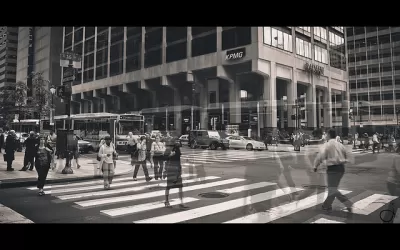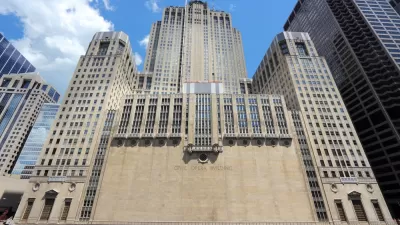Center City in Philadelphia offers a case study for one of the largest and potentially most consequential contingencies of the pandemic: What happens to downtowns is most workers never come back to the office?

Jake Blumgart focuses on Center City, the central business district of Philadelphia, as a case study in the potential mid- and long-term effects of the pandemic on downtowns all over the United States as the pandemic recedes and workers return to the office.
The question of whether workers will return at all, and in what numbers, is the big question driving the discussion. Bumgart dares to pose the question of what happens to Center City if workers in fact do not return.
The possibility for a sea change in the culture of work and commuting is already evident, writes Blumgart:
Before the pandemic, less than a tenth of the American labor force worked from home; now, more than a fifth are doing so. Yet even that undersells the extent of the change. Two-thirds of the nation’s professional-class workers, the kind who filled the offices of Center City and its counterparts across the country, were working from home at the height of the pandemic. The freelancing platform Upwork estimates that nationally, 20 to 25 percent of those professional jobs will become permanently remote over the next five years.
Even if 80 percent of workers go back to the office full time, the effect on the economy would be enormous, says one of the sources cited in the article. As Blumgart details, mobility and work has changed before—Philadelphia is a perfect example of a city evolving over the decades. The challenge is that a shift to remote work and a decline in foot traffic and economic activity in downtowns could have an outsized effect on cities like Philadelphia: "Office buildings could be forced to downsize, with corresponding hits to property and wage taxes. Then there’s the question of consumer spending: All those coffee breaks, catered lunches and happy hours add up to a lot of jobs, small businesses and sales tax revenue."
Much more detail and analysis are to be found in the feature-length source article at the link below. A discussion about what could go right for Center City, for example, can be found among the discussion about the realities of living and working in post-pandemic downtowns.
FULL STORY: What Will Happen to Center City If Commuters Never Return?

Planetizen Federal Action Tracker
A weekly monitor of how Trump’s orders and actions are impacting planners and planning in America.

Maui's Vacation Rental Debate Turns Ugly
Verbal attacks, misinformation campaigns and fistfights plague a high-stakes debate to convert thousands of vacation rentals into long-term housing.

Restaurant Patios Were a Pandemic Win — Why Were They so Hard to Keep?
Social distancing requirements and changes in travel patterns prompted cities to pilot new uses for street and sidewalk space. Then it got complicated.

In California Battle of Housing vs. Environment, Housing Just Won
A new state law significantly limits the power of CEQA, an environmental review law that served as a powerful tool for blocking new development.

Boulder Eliminates Parking Minimums Citywide
Officials estimate the cost of building a single underground parking space at up to $100,000.

Orange County, Florida Adopts Largest US “Sprawl Repair” Code
The ‘Orange Code’ seeks to rectify decades of sprawl-inducing, car-oriented development.
Urban Design for Planners 1: Software Tools
This six-course series explores essential urban design concepts using open source software and equips planners with the tools they need to participate fully in the urban design process.
Planning for Universal Design
Learn the tools for implementing Universal Design in planning regulations.
Heyer Gruel & Associates PA
JM Goldson LLC
Custer County Colorado
City of Camden Redevelopment Agency
City of Astoria
Transportation Research & Education Center (TREC) at Portland State University
Jefferson Parish Government
Camden Redevelopment Agency
City of Claremont





























